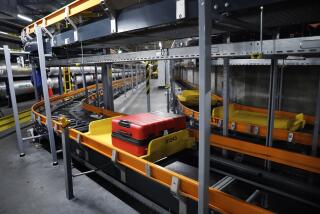Twice-Fired Controller a Source in Drug Probe
- Share via
A controller-trainee who had twice been fired and who admitted using marijuana and amphetamines was a key source of information that the Federal Aviation Administration relied upon in an investigation of off-duty drug use that led to the temporary suspension of 34 air traffic controllers, according to an FAA document.
The informant, John Anthony Evans, 35, assigned to the Los Angeles Air Route Traffic Center in Palmdale, told two FAA special agents on Aug. 21 that he had seen numerous colleagues using drugs at several parties he had attended during the last two years and provided a list of names.
By the following afternoon, the FAA had taken 34 of the Palmdale center’s 156 controllers off their radar screens and placed them on administrative leave.
21 Cleared
By last week, 21 of the suspected controllers had been cleared to return to their jobs but 13 others had been told to enroll in drug rehabilitation programs or be fired.
It has been known that the Palmdale investigation was triggered last spring when Los Angeles County sheriff’s deputies arrested the secretary to the Palmdale center’s manager on suspicion of cocaine possession and found the names of controllers in her phone book. Until now, however, it was not known how the FAA moved beyond that circumstantial evidence to justify suspending the 34 controllers.
Still unclear is whether Evans was the lone informant, as suspected by some controllers, and whether he approached FAA investigators or whether they were led to him. Evans’ mother said Wednesday that her son was out of town and unavailable for comment.
Several of the exonerated controllers said Wednesday that the realization that their suspensions were based on charges by Evans made them even more bitter about the FAA’s handling of the Palmdale investigation. They portrayed Evans as a controller of questionable ability who was desperately trying to keep his job.
Called Mind-Boggling
“For them to take this guy’s word, a guy who’s been hired and fired, over my word and make me subject to this type of persecution is mind-boggling because I’ve worked . . . to help rebuild this system in the last five years,” said Dave Allec, who said he has worked as a controller for 12 years and was one of the relatively few controllers who did not strike in a 1981 labor dispute that resulted in the firing of most of the FAA’s force of controllers.
The National Air Traffic Controllers Assn., an organization that is attempting to unionize the nation’s controllers, has complained that the FAA failed to use proper standards of suspicion or proof in its probe and set a poor precedent in the burgeoning field of work-related drug investigations.
Evans’ role surfaced this week when the FAA gave each of the 34 controllers a packet of documents intended to explain why each controller had been under suspicion.
Three of the exonerated controllers said they were named solely by Evans and that many of their suspended colleagues made the same discovery as they read their individually prepared FAA packets.
In his Aug. 21 interview, a copy of which was obtained by The Times, Evans said that he joined the FAA at Gillespie Field in El Cajon in November, 1979, but was terminated 10 months later.
In early 1982--a time when the FAA was trying to rebuild its ranks after the mass firing of controllers--Evans said he was hired again and sent to the FAA’s training academy in Oklahoma City but “did not pass” and was fired again that May.
Hired Third Time
Evans said he was hired as a controller for a third time by the FAA in Oakland in October, 1983, and the following June was transferred to the Palmdale center, which is responsible for guiding all aircraft in and out of dozens of Southland airports once they leave the jurisdiction of local airport control towers.
According to his statement, Evans “did a little bit of marijuana” while working in San Diego and took amphetamines before being hired in Oakland but did not disclose this information to the FAA when applying for work.
At one party at his residence in Palmdale, Evans said, he estimated that seven or eight controllers used drugs.
His evidence: They “kept going suspiciously into one of the bedrooms.”
Several controllers said they have not seen Evans at the Palmdale center since the day he gave his statement to investigators.
A personnel executive at the Palmdale center said Evans is still employed as a controller there but declined to say whether he is currently assigned to traffic-control duties.
More to Read
Inside the business of entertainment
The Wide Shot brings you news, analysis and insights on everything from streaming wars to production — and what it all means for the future.
You may occasionally receive promotional content from the Los Angeles Times.










